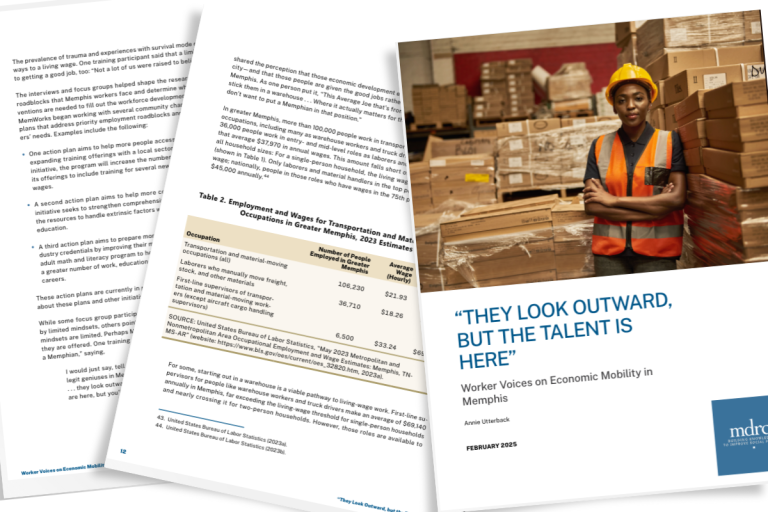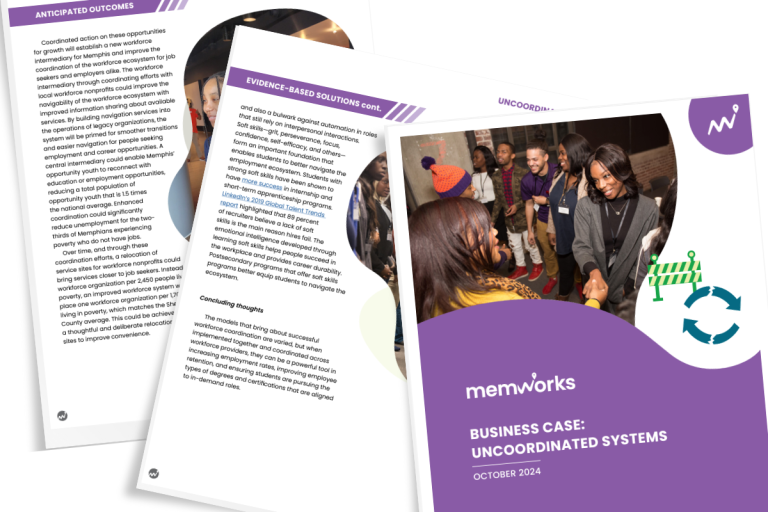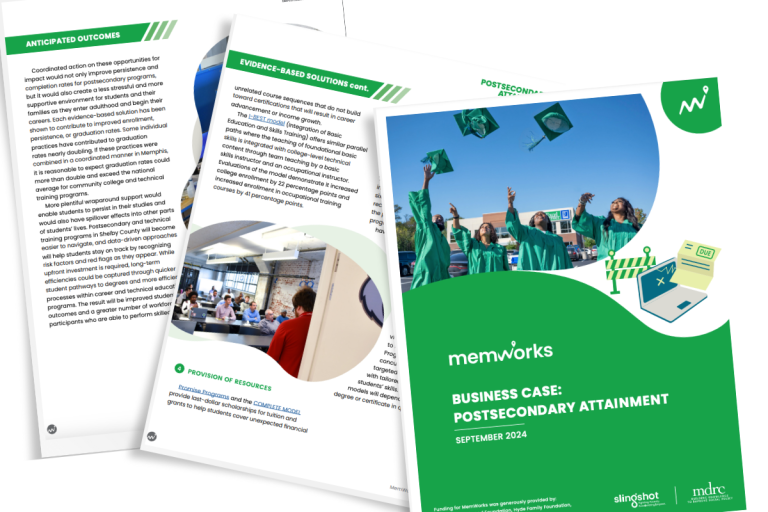The lack of resources and support allow seemingly insignificant factors to derail the completion of career & technical education programs.
MemWorks has helped us identify the root causes that are impeding employment pathways for Memphians experiencing poverty. An accurate understanding of these roadblocks is absolutely essential, but without knowing how to effectively overcome these roadblocks we are still unable to enable pathways to living-wage jobs.
We are excited to share evidence-based interventions that can help our community overcome these roadblocks. This blog shares a roadmap for how we can provide people the necessary support to enable them to persist and graduate from postsecondary programs – community college, technical programs, and certificate programs – and pursue living-wage careers.
Students struggle to complete postsecondary programs
Six out of every ten Tennessee community college students experiencing poverty do not continue after the first year. In Shelby County, only 2 in 10 community college students graduate within six years. Numerous compounding factors, such as incidental life expenses and inefficient enrollment processes, can undermine program completion.

Evidence-based solutions can increase postsecondary achievement
Five evidence-based models stood out as we analyzed interventions that are successful helping young adults experiencing poverty persist and ultimately graduate from postsecondary programs:
- The Comprehensive Approaches to Student Success (CASS) model provides wraparound programming complete with targeted financial, academic, and other student support services in community college settings. This support has been shown to nearly double graduation rates within a few years in multiple community colleges.
- Early Alert and Intervention Systems complement the CASS model by providing a formal, intentional process of identifying, monitoring, and supporting students throughout their coursework. Alerts provide formal, proactive feedback, and student-support agents are alerted to and proactively address red flags.
- The Connected Scholars Program focuses on cultivating skills and attitudes needed to forge connections to help advance students’ academic and career goals but does not require the pairing of formal mentors. Students learn about the importance of social capital in advancing their goals through experiential activities and real-world practice.
- Stackable Credentials enable students to pursue a sequence of industry-recognized credentials that can accumulate over time to demonstrate a person’s expanded competencies, which enables career advancement and increased wages.
- The COMPLETE Model provides last-dollar scholarships for tuition and grants to help students cover unexpected financial burdens. These models also offer near-peer coaches that provide mentorship to students on top of the program’s financial support.
Case examples: Postsecondary attainment in action

Backrs, founded in Memphis, is an online platform that supports high-performing, under-resourced postsecondary students, primarily through mentorship and financial stipends. The platform connects students with experienced adults for guidance and college access support.

City University of New York (CUNY) Accelerated Study in Associate Programs (ASAP) is a community college model aimed at facilitating students’ completion of Associate’s degrees by reducing access barriers. It offers academic support, financial assistance, and career development.

Learn and Earn to Achieve Potential (LEAP) is a national organization targeting youth aged 14-25 who are disengaged from school and work. It aims to provide pathways to employment and further education. The program’s success relies on cross-system partnerships that engage postsecondary institutions and workforce nonprofits across the community.
A path forward for Memphis
Several workforce programs and postsecondary institutions in Memphis implement some of the evidence-based models outlined above. The Collective Blueprint, Agape Child & Family Services, Moore Tech, The Soulsville Charter School, Persevere, and tnAchieves incorporate varying degrees of evidence-informed practices in their programs associated with improving postsecondary attainment.
There are several opportunities to improve postsecondary attainment in Memphis:
- Enhance existing community college persistence programs to incorporate best-in-class models and implement them effectively
- Implement formal persistence programs where they do not currently exist
- Strengthen postsecondary persistence efforts at the K-12 level to smooth the transition to postsecondary education for students
- Enhance existing persistence programming provided by tnAchieves and expand its implementation in the Memphis area
Together we can help job-seeking Memphians experiencing poverty overcome barriers and complete their postsecondary programs on their way to living-wage career paths.





